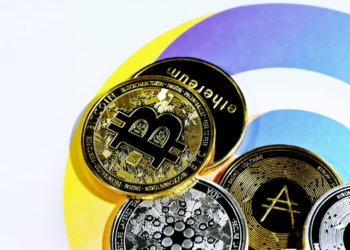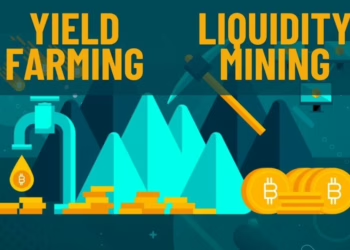In recent times, new technologies have been developed to improve the operations of companies and benefit individuals. The world has witnessed the coming of Virtual Reality, Augmented Reality, the Internet of Things, Artificial Intelligence, Blockchain technology, and now the Internet of Value. These technologies have varying purposes, but they all aim to improve lives. In some cases, these technologies are linked to one another.
Over time, companies have been experimenting with ways that blockchain can interact with AI, VR, AR, IoT, and now IoV, especially since it is a value-exchange protocol.
This article examines the concept of the Internet of Value and what this emerging technological innovation has to offer.
What is the Internet of Value?
The Internet of Value is a concept coined by blockchain company Ripple, which describes a scenario where value is exchanged between individuals, companies, and the government, in a similar manner to information exchange.
The advent of cryptocurrencies and blockchain technology has simplified the global exchange of value. The Internet of Value refers to an ecosystem where individuals can seamlessly exchange value with one another without the intervention of a centralized authority or high costs.
In this theoretical space, individuals, regardless of where they reside, would be able to easily transfer any object of value to others. Value can be in the form of money or quasi-money instruments such as financial instruments, or it may be an object of social value, like exercising one’s voting power.
Ripple discloses that “with the Internet of Value, a value transaction such as a foreign currency payment, can happen instantly, just as how people have been sharing words, images, and videos online for decades. And it’s not just money. The Internet of Value will enable the exchange of any asset that is of value to someone, including stocks, votes, frequent flyer points, securities, intellectual property, music, scientific discoveries, and more.”
Ripple believes that this technology will be crucial to the development of the second era of the internet, as it will make information exchange as seamless as transferring information via the internet at the moment.
Ripple is developing payment solutions for traditional and decentralized financial institutions such as banks, cryptocurrency exchanges, etc.
What Are The Use Cases Of The Internet of Value?
The Internet of Value possesses a wide array of use cases, especially as the concept of Web3 evolves. A major area in which this technology will be heavily utilized is the payments sector. Some use cases of the Internet of Value technology are listed below.
Payments
Traditional payment is heavily dependent on the Society for Worldwide Interbank Financial Telecommunication, legally S.W.I.F.T. SC, a “Belgian cooperative society providing services related to the execution of financial transactions and payments between banks worldwide.”
The concept of the Internet of Value is based on the exchange of value with less reliance on centralized authorities, thereby reducing the bottleneck associated with traditional payment structures. It provides users with global access to instant and frictionless payments.
Sending money from one country to another is often difficult, especially if the sender’s home country has poor relations with the recipient’s country. The Internet of Value eliminates these bottlenecks.
According to the creator of this concept, Ripple believes that IoV will introduce “a standard protocol for how every institution and individual connects across various networks to exchange data.”
The benefits of this cannot be overstated because it will improve global financial inclusion while also developing startups and industries that intend to build in this space.
Access to financial instruments
Traditional finance (TradFi) is often criticized for its lack of inclusion for most individuals. Some financial instruments have a high barrier of entry, making access to these assets difficult for individuals and retail investors.
The Internet of Value democratizes the financial space, making it easy for anyone with access to the internet to buy financial instruments. In the traditional financial sector, various institutions such as brokers, banks, exchanges, and regulators must collaborate to ensure the ecosystem’s efficiency, which can sometimes slow down the process.
In other cases, the minimum buy-in value for some assets is prohibitively expensive and not available to the average individual. Fragmentation of assets is a feature that is not available in traditional finance. Tokenizing assets such as financial instruments on the blockchain offers everyone access to these assets.
Expensive assets such as art, gold, and real estate are often not accessible to the average individual. The Internet of Value, through blockchain technology, incorporates the element of fragmentation into the financial space. Asset tokenization permits crypto enthusiasts to purchase fragmented assets.
Platforms like StaFi and Synthetix are revolutionizing the financial sector by trading synthetic assets on the blockchain. Synthetic assets are representations of real-world assets. StaFi users can stake their PoS tokens on the network and gain access to synthetic assets in the form of rTokens.
Transparency
The Internet of Value is a blockchain-based technology, which means it has the features of this technology, such as transparency and accountability.
Transparency enables anyone to view the history of transactions and previous datasets. Because of the blockchain’s immutability, records are permanent and can’t be altered.
The Internet of Value will benefit businesses, individuals, and platforms seeking transparency in their operations.
Data Storage
Traditional means of data exchange have risks, such as the involvement of intermediaries, which can lead to unauthorized personnel having access to the data. This may degenerate into data compromise or leakage.
Financial institutions often utilize traditional storage systems such as paper-based mechanisms, which can easily be intercepted or stolen. Apart from the downsides mentioned earlier, traditional storage systems are also known to be expensive and unsafe.
The Internet of Value, through blockchain technology, adds an extra layer of security to data storage by allowing only those with authorization to access the data.
This is due to the Know Your Customer (KYC) process, which prevents unauthorized individuals from accessing the data. Some blockchain platforms, such as Filecoin, allow users to offer their idle storage space in exchange for monetary rewards.
Decentralized Lending
Most people find obtaining loans and other lending instruments difficult due to the hoops of red tape involved in the process. Traditional banks require individuals to have high credit scores, meet stringent requirements, and much more, making it difficult to access financial instruments.
A new type of lending known as decentralized lending has emerged on the blockchain, and it is now a critical aspect of Decentralized Finance.
Decentralized lending is typically done through peer-to-peer or peer-to-contract lending, which makes the process more efficient, accessible, and affordable. Value can be exchanged between borrowers and lenders of different types of assets.
What Are The Differences Between the Internet of Value and the Internet of Things?
The Internet of Things (IoT) is a system that involves devices all over the world interacting via a specific type of connectivity.
As they interact, the collected data is sent to the cloud for processing, and actions are performed without human intervention.
The Internet of Value differs from the Internet of Things, though some people may mistake them for each other. Some distinctions are listed below.
- The Internet of Value (IoV) is an online ecosystem that enables users to easily transfer value to others, which can be monetary assets or social value, without needing a centralized authority. On the other hand, the Internet of Things encompasses any device that can connect to the internet and interact with one another.
- Internet of Value focuses on internet-based items with monetary or social value. This technology aims to eliminate the need for centralized authorities to exchange monetary value. On the other hand, the Internet of Things is a network of items that allows devices to interact with one another.
In Conclusion,
- The Internet of Value is a concept coined by blockchain company Ripple that describes a scenario in which value is exchanged between individuals, businesses, and governments in the same way that information is exchanged.
- The Internet of Value concept is based on the exchange of value and the elimination of the need for centralized authorities, reducing the bottlenecks associated with traditional payment structures.
- The Internet of Value democratizes the financial space, making it easy for anyone with access to the internet to buy financial instruments.
- The Internet of Value, through blockchain, incorporates the element of fragmentation into the financial space.
- The Internet of Value is a blockchain-based technology, which means it has the features of this technology, such as transparency and immutability.
- The Internet of Value, through blockchain technology, adds an extra layer of security to data storage because only those with authorization are permitted to access the data.
- The Internet of Value’s use cases are not limited to the financial sector.
If you would like to read more articles like this, visit DeFi Planet and follow us on Twitter, LinkedIn, Facebook, and Instagram.
“Take control of your crypto portfolio with MARKETS PRO, DeFi Planet’s suite of analytics tools.”




















